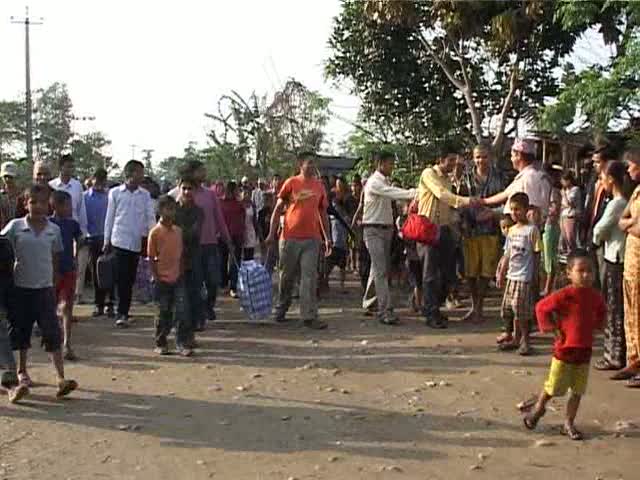Refugees Magazine Issue 104 (UNHCR's World) - Nepal: All things to all people
Refugees Magazine, 1 June 1996
Social Services Officer Jennifer Ashton has to be all things to all people in her work with refugees in south-east Nepal.
By Jennifer Ashton
UNHCR Social Services Officer – Jhapa, Nepal
A UNHCR social services officer is all things to all people: the person who cares for the most vulnerable; who tries to find solutions to the irreparable; who works with the refugees to strengthen their capacity for self-help; who minds the schools, the clinics, the trauma centres that operate for refugees.
"My work is so varied, I'm responsible for such wide-ranging areas – I can never be quite sure of what will happen on any day," says Jennifer Ashton, a 44 year-old Australian officer in UNHCR's Jhapa sub-office in Nepal. Staff in Jhapa include a head of sub-office and one officer each covering social services, protection (legal rights) and field (programme and logistics). Together, they help oversee the care of more than 90,000 refugees from Bhutan.
Refugees fled southern Bhutan in the early 1990s, claiming to have been targeted for human rights abuse. Their seven camps around Jhapa are clean and orderly, and provide basic assistance: health care, education, and skills training projects that help the refugees earn some income while providing basic needs like soap. Ashton monitors projects to help women learn skills and to counsel victims of rape or torture. She also monitors schools, clinics, and out-reach programmes for vulnerable families.
UNHCR-funded programmes, implemented with NGOs, train women to read and write, and teach basic legal rights. Ashton encourages women to run for the annual election of camp committees, which manage many aspects of camp life. She ensures that a network of concerned refugees – one or two per hundred families – keeps an eye on elderly people, the disabled, and women looking after families alone.
Ashton is an administrator and monitor. She liaises with relevant local officials, oversees projects and sorts out major issues.
"Sometimes it seems as though something that might take half an hour in Australia is taking days and days to work through in the camps," Ashton sighs. "But it's by that endless talking that they all – the Nepalese officials, the refugees, the NGOs – come to feel that they are all on board, that the solution really is the right one."
The quality of social services in Jhapa's camps is often praised, but Ashton insists that the credit for camp management should go to the whole UNHCR team. "The international staff is Thai, Sri Lankan, Filipina and Australian," she wrote in a recent note. "We bring different backgrounds and skills to the job. Arun, the head, who has worked with UNHCR for 16 years, brings to bear his strong knowledge of how the organization works. He has also developed good working relations with all the dignitaries and politicians – local and refugee – which requires skills in tact and diplomacy, and which really makes our work flow easily. Nihal, a former senior army officer, brings his experience to bear in organization and logistics. Corinna, with her legal training, provides logical, carefully-reasoned problem-solving responses. Our local staff were all recruited into the operation with no previous knowledge or experience of refugees, this being the first refugee crisis in the area. They've all learned an enormous amount on the job.
Most of Jhapa's refugees have lived in exile for five years or more. "In terms of camp setup and services, these are really nice places – in large part due to the refugees themselves," says Ashton. "But they've been waiting so long, with no solution in sight. We're seeing quite a bit of despair, more alcoholism, more domestic violence; the problems that are generated by idleness and prolonged life in camps."
Ashton lives downstairs from her landlord, a bank manager in the sleepy, dusty town of Bhadrapur. Her children – James, 13, and Alexandra, 10 – live in Katmandu with their father, who has given up his job as a geophysicist and now freelances for Australian magazines. Plane service is sporadic, at best. During the monsoon season, there is none. Ashton rarely sees her family more than once a month. Temperatures climb as high as 40 degrees Celsius; the humidity is stifling. It's not the worst place UNHCR operates, but life in Bhadrapur is lonely, hot and hard.
"I love my job," Ashton says. "The children know that I'm happiest when I'm doing this sort of thing. But if I talk about it too much, to be honest, I want to just burst into tears. And for my husband – well, it's hard for anyone to be an accompanying spouse; awful to be asked all the time, 'What do you do?'
"Refugees don't usually flee to capital cities. They go to insecure and remote border-areas where your family can't come with you. So this is the life that UNHCR staff live," Ashton continues, ruefully. "It's rewarding and it's important, but at the end of the day, the hardest thing about working for UNHCR is the enormous personal cost."
Source: Refugees Magazine Issue 104 (1996)





